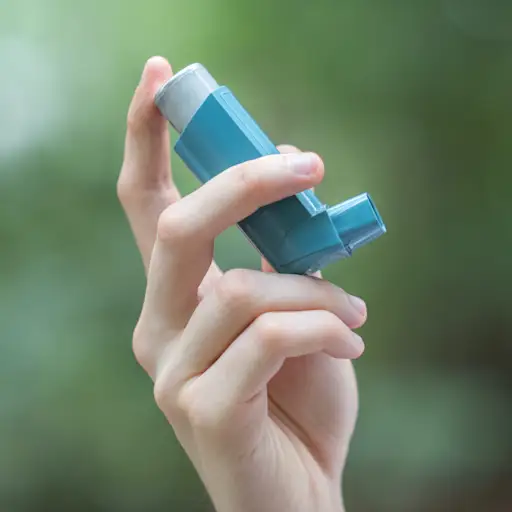What to Expect When You Start Asthma Meds

For the 25million people in this country dealing with asthma, medication is a lifeline—literally. It can mean the difference between a life marked with disruptive symptoms like difficulty breathing, coughing, wheezing, shortness of breath, and chest tightness, and one that’s relatively symptom-free. A chronic condition, asthma is an inflammation or swelling in the airways that carry air to and from the lungs, making breathing tougher. Doctors aren’t sure why asthma crops up, but they suspect it’s due to a combo of genetics and environmental factors.

The 411 on Asthma Medications
Not only can asthma meds control symptoms, prevent attacks, and keep air passages open during an attack, but with regular dosing, they can boost your quality of life every day. They can also help you sleep more soundly by eliminating disruptive nighttime saboteurs like coughing or wheezing. And they can also help you breathe a sigh of relief during exercise thanks to quick-relief asthma medications, taken before exercise, which work to control exercise-induced symptoms. In short, they’re life-savers… literally.

Finding the Right Asthma Meds
的类型和剂量哮喘药物需要开掘ds on your age, symptoms, severity of the condition, and any side effects you might experience. Because asthma symptoms can change over time, your med requirements might not always be the same. “Your doctor will work with you to find the right combination of medicines to manage asthma and adjust the type and amount based on your symptoms,” says Tonya Winders, president and CEO of the Allergy & Asthma Network in Hendersonville, TN. “The goal of asthma treatment is to have you feel your best with the least amount of medicine.”

Asthma Med #1: Quick-Relief
These drugs work within minutes to relieve symptoms and are effective for four to six hours. Types of quick-relief meds include short-acting beta agonists like albuterol, Ipratropium (Atrovent), and oral and intravenous corticosteroids (for serious asthma attacks). “They help the muscles around the airways relax,” says Kevin McGrath, M.D., a spokesperson for the American College of Allergy, Asthma and Immunology in Wethersfield, CT. “However, you should be aware that your asthma is not well-controlled if you use a rescue inhaler more than two-to-three times per week.”

Asthma Med #2: Controllers
The most effective controller medications are inhaled corticosteroids (Flovent, Asmanex, and Pulmicort), anti-inflammatory drugs that reduce swelling and tightening in your airways. Keep in mind, you may need to use them for several months before reaping the max benefits. “When used properly your airways become less inflamed, mucous plugging is decreased, and muscle tightening is reduced, which makes your airways less likely to react to a trigger,” Dr. McGrath says. These types of meds are taken regularly (even when there aren’t any symptoms). Side effects include mouth and throat irritation and oral yeast infections.

Asthma Med #3: Biologics
If you have a severe form of asthma that isn’t responding to controller meds alone, your doctor may recommend a class of medication known as biologics. “These target the specific cells and pathways that cause inflammation related to severe asthma,” Winders says. They are given by injection or infusion every few weeks. Side effects may include muscle aches, fatigue, headaches, or weakness. Biologics are often taken in conjunction with controller medications.

Maximizing Your Treatment Plan
While taking your meds on the regular is key to keeping asthma symptoms in check, you still need to manage the condition by avoiding triggers, Winders says. Seeing your doctor is also key: The National Asthma Education and Prevention Program’s expert panel recommends people whose asthma is well under control should visit their doctor every six months. People with moderate or severe asthma should see their doctor more often. Even if you think your asthma is in check, your doctor needs to monitor your lung function with tests like spirometry, which you can’t do at home.

Keep Track of Symptoms and Side Effects
最好的办法知道你的药物或者我工作f they need to be tweaked is by taking note of any symptoms and side effects. “Keeping a journal can help people identify asthma triggers such as smoke, pets, pollen, and molds,” Dr. McGrath says. It gives both the patient and their doctor valuable information about how well their care plan and medications are working. Knowing whether asthma attacks are being controlled and/or prevented, and if your triggers are changing, is crucial info for managing the condition and adjusting frequency and type of medication.

Go With the Flow
Part of staying ahead of asthma means doing some daily monitoring so you know just how well your lungs are functioning. A peak flow meter is a small, handheld device (you should have one at home) that measures the speed of air moving through your lungs. By gauging the amount of air your lungs can move out, you can tell how well controlled (or not) your asthma is, Dr. McGrath says. Even more important, by using a peak flow meter you can catch an asthma attack early on by knowing your peak flow meter numbers, he says.

Have a Plan in Place
In case of an asthma attack, it’s important to have an action plan in place. With the help of your doctor, write detailed instructions for treating your asthma on the day-to-day as well as what to do in case of emergency. Your plan should include your known asthma triggers, the medications you need to take based on signs, symptoms, or peak flow measurements, and whom to call in case of emergency, as well as your healthcare provider and a local hospital. The purpose of this plan is to prevent or manage an asthma attack early before it becomes an emergency.
All About Asthma:NIH Medline Plus. (n.d.) “Asthma.”https://medlineplus.gov/asthma.html
Understanding Asthma Medications:Mayo Clinic. (2020.) “Asthma Medications: Know Your Options.”https://www.mayoclinic.org/diseases-conditions/asthma/in-depth/asthma-medications/art-20045557
Biologics & Asthma:Cleveland Clinic. (2020.) “Biologic Therapy for Severe Asthma.”https://my.clevelandclinic.org/health/treatments/17711-biologic-therapy-for-severe-asthma
Benefits of Peak Flow Measurements:NIH StatPearls. (2021.) “Peak Flow Rate Measurement.”https://www.ncbi.nlm.nih.gov/books/NBK459325/
Jennifer Tzeses is a writer and content strategist specializing in health, beauty, psychology and lifestyle. She's written forThe Wall Street Journal, Mind Body Green, CNN,Architectural Digest,Barron's,Cosmopolitan,Harper's Bazaar, Psycom,Elle,Marie Claire, and more. Follow her on Instagram @jtzeses.

